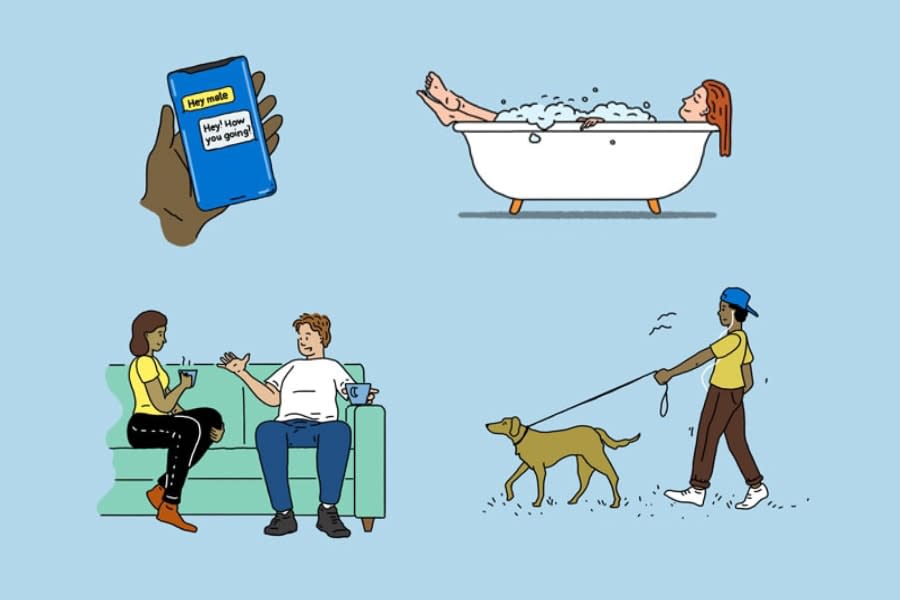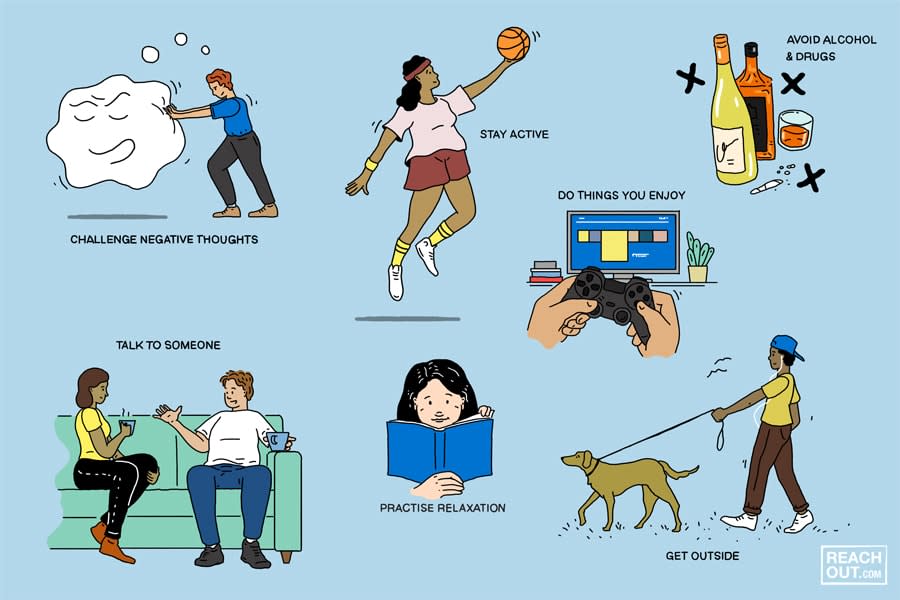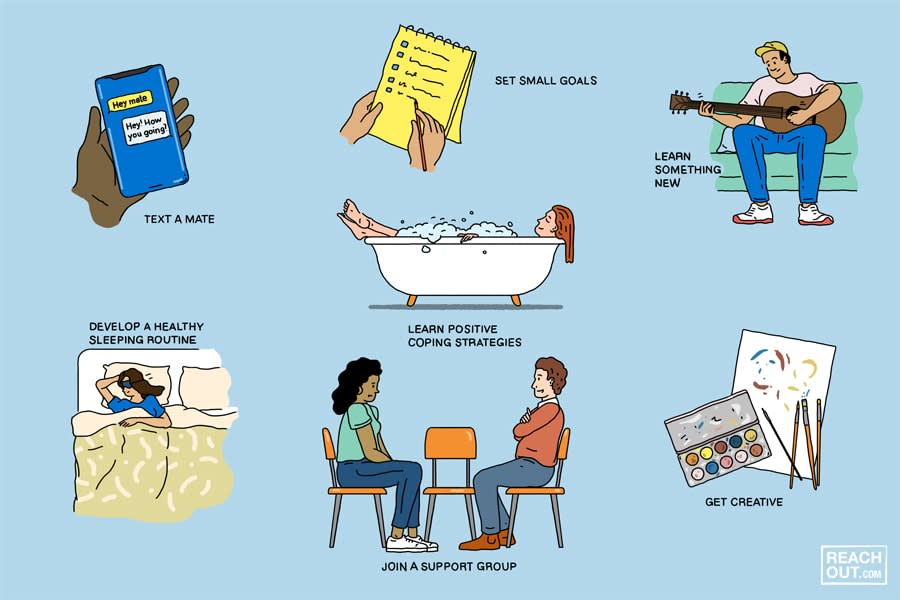우울증에 대한 자조는 기분을 개선하고 증상을 관리하는 데 효과적일 수 있습니다. 우울증에 대처하는 방법이 궁금하다면 스스로 할 수 있는 간단한 일들이 있습니다.
다음과 같은 경우에 도움이 될 수 있습니다.
기분이 좋지 않거나 우울한 에피소드를 경험하고 있습니다.
기분을 개선하는 데 도움이 되는 추가 도구를 원합니다.
당신은 우울할 때 동기를 부여하는 방법을 찾고 있습니다.
우울증 자조 전략에 대한 몇 가지 삽화. 첫 번째 이미지는 스마트폰으로 친구와 대화하는 모습입니다. 두 번째 이미지는 거품목욕을 하고 있는 사람입니다. 세 번째는 소파에서 친구와 이야기를 나누는 사람입니다. 네 번째는 개를 산책시키는 사람입니다.
우울증에 대한 ‘자조 전략’은 무엇입니까?
신뢰하는 사람이나 정신 건강 전문가에게 도움을 구하는 것 외에도 우울증을 스스로 해결할 수 있는 다른 방법이 있습니다. 당장에는 차이를 느끼지 못할 수도 있지만, 이러한 기술을 매일 연습하면 자신에 대해 안타까움을 느끼면 일이 줄어들고 기분이 더 나빠지는 우울증의 ‘주기’를 극복하는 데 도움이 됩니다.
우울증 자조 전략 시작하기
부정적인 생각에 도전하세요
자신의 생각을 적어 보는 것은 기분을 우울하게 하고 우울하게 만드는 생각을 식별하는 좋은 방법입니다. 우리가 무언가를 생각한다고 해서 그것이 사실이라는 의미는 아닙니다. 따라서 부정적인 생각에 도전하는 방법을 배우면 전반적인 기분과 자존감에 도움이 될 수 있습니다.
예를 들어, ‘아무도 나에게 관심이 없어’라고 생각한다면, 그 생각에 예외가 있는지 자문하고 ‘내 여동생이 나에게 관심을 갖고 있다’와 같은 대안적인 생각을 떠올림으로써 이 생각에 도전할 수 있습니다. ‘
기분이 매우 좋지 않고 생각을 정리하는 데 어려움을 겪는다면, 스스로 적는 것을 피하고 대신 정신 건강 전문가의 도움을 구하세요. 이를 수행하는 것이 심리학자들이 우울증 치료에 널리 사용하는 방법론인 ‘인지 행동 치료'(CBT)의 핵심 부분입니다. 우울증에 도움이 될 수 있는 CBT 및 기타 유형의 치료법에 대해 자세히 알아보세요.
술과 약물 이외의 방법으로 우울증에 대처하는 방법 찾기
대처하기 위해 알코올과 약물을 사용하는 경우 실제로 증상이 악화될 수 있습니다. 때때로 마약과 술은 우리의 기분을 곧바로 악화시킵니다. 어떤 경우에는 처음에는 기분이 좋아질 수도 있지만 나중에는 시간이 지나면서 기분이 훨씬 더 나빠질 수도 있습니다. 알코올이나 약물 사용을 줄이는 방법에 대한 몇 가지 정보를 얻으십시오.
활동적인 상태를 유지하세요
운동과 우울증은 훌륭한 조합입니다! 운동은 에너지 수준에 변화를 가져올 수 있으며 호르몬(예: 엔돌핀)을 자극하여 자신에 대해 더 나은 기분을 갖게 해줍니다. 활동 수준을 높이기 위한 현실적인 목표를 세우십시오.
예를 들어, 지난 며칠 동안 침대에서 일어나는 것조차 힘들었다면 달성 가능한 목표는 방을 떠나 집 안을 돌아다니는 것일 수도 있습니다. 그 후에는 더 크게 생각하기 시작할 수 있습니다. 길을 걷거나 집에서 5분간 요가를 하는 목표를 세우세요. 작게 시작하면 관리가 더 쉬워지고 기대치를 현실적으로 유지하는 데 도움이 됩니다.
좋아하는 일을 하여 우울증 주기를 극복하세요
우울할 때는 기분을 좋게 만드는 일을 하려는 동기를 부여받기가 어려울 수 있습니다. 우울증을 앓고 있다면 어떤 일을 즐기는 것이 불가능해 보일 수도 있습니다. 그럼에도 불구하고, 매일 당신이 즐겨 하던 일을 스스로 하도록 노력하여 성취감을 느끼도록 하십시오.
활동은 책 5페이지 읽기, 좋아하는 노래에 맞춰 춤추기, 다큐멘터리 보기, 5분 동안 그림 그리기 등 매우 간단할 수 있습니다.
더 많은 우울증 자조 영감을 얻기 위해 간단하고 재미 있고 에너지가 적은 활동을 제공하는 ‘휴식 방법’ 라이브러리를 확인하세요.
누군가와 이야기해 보세요.
우울할 때 물러나는 것이 일반적이지만, 이로 인해 기분이 더 나빠질 수 있습니다. 친구들과 다시 연결해 보세요.
다시 한 번 목표를 현실적으로 만드세요. 친구를 아예 피하고 있었다면 그 동안 미뤄두었던 문자를 보내거나 답장을 보내는 것이 출발점일 수 있습니다.
아는 사람과 이야기하고 싶지 않다면 ReachOut 온라인 커뮤니티에서 다른 사람들과 소통해 보세요.
밖으로 나가세요
야외로 나가는 것은 우울증에 대한 자조에 접근하는 좋은 방법이 될 수 있습니다. 애완동물, 식물, 정원, 공원 등 자연과 상호 작용하면 스트레스가 줄어들고 기분이 좋아집니다.
햇빛은 기분을 조절하는 데에도 도움이 됩니다. 신선한 공기가 있는 야외에서 몇 분 동안 서 있거나, 감당할 수 있다면 한 블록을 산책해 보세요. 밖에서 시간을 보내는 것을 좋아한다면 하루에 한 시간씩 동네 공원에서 책을 읽거나 그림을 그리거나 글을 쓰며 시간을 보낼 수도 있습니다.
먹는 음식에 변화를 줘 보세요
‘건강한 식단’이라는 용어는 다양한 사람들에게 다양한 의미를 갖습니다. 하지만 사실 건강한 식단이란 편리하고 편안하며 필요한 모든 영양소를 제공하는 음식을 먹는 것을 의미합니다.
그러나 일부 연구에 따르면 일부 영양소는 우울증 치료에 매우 도움이 될 수 있습니다.
단백질 : 준다
하루 종일 에너지가 오래 지속되고 정신이 맑아지는 데 도움이 됩니다. 콩, 고기, 계란, 두부는 모두 단백질이 풍부한 음식입니다.
비타민 B: 신체에서 다양한 기능을 수행하는 영양소 그룹입니다. 그들이 하는 일 중 하나는 음식에서 에너지를 분해하는 것입니다. 따라서 식단에 이러한 에너지가 충분하지 않으면 기분에 영향을 미치고 우울증과 같은 다른 문제에 기여할 수 있습니다. 통곡물 빵, 신선한 고기, 콩, 견과류, 짙은 녹색 야채에서 찾을 수 있습니다.
오메가-3: 생선, 콩, 카놀라유, 견과류 및 짙은 녹색 야채에서 발견되는 일종의 ‘지방산’입니다. 이는 뇌 기능에 중요하며, 연구에 따르면 낮은 수준의 오메가-3가 우울증에 기여할 수 있다는 사실이 밝혀졌습니다.
이것이 반드시 완전히 새로운 ‘다이어트’를 의미하는 것은 아닙니다. 그것은 단지 몇 가지 다른 음식을 시험해 보고 그 음식이 당신에게 어떤 느낌을 주는지 확인하는 것을 의미할 수 있습니다. 게다가 요리를 좋아한다면 의미 있고 즐거운 취미를 가질 수도 있습니다!
식단에 큰 변화를 주기 전에 담당 GP에게 확인하세요.
우울증 관리를 위한 휴식 연습
휴식은 스트레스를 줄이는 데 좋습니다. 긴장을 푸는 데 도움이 되는 것들의 목록을 적어두고 여유 시간이 있을 때 편리하게 보관하세요. 공원에서 개와 놀든, 거품 목욕을 하든, 발을 차든 상관없습니다. 긴장을 풀고 재충전하는 데 도움이 되기만 하면 됩니다. 아이디어가 떠오르지 않는다면 여기에서 저렴하게 휴식을 취할 수 있는 다양한 방법이 있습니다.
미디어 소비에 대해 생각해 보세요
지금쯤이면 소셜 미디어가 우리에게 줄 수 있는 몇 가지 긍정적인 일을 경험했을 것입니다. 아마도 소셜 미디어 사용을 우울증 및 기타 정신 건강 문제와 연관시키는 일부 연구에 대해 들어보셨을 것입니다. TV 쇼부터 영화, 게임에 이르기까지 우리가 소비하는 다양한 유형의 미디어에 대해서도 마찬가지입니다.
당신이 할 수 있는 한 가지 일은 당신이 소비하는 미디어에서 당신을 슬프고, 불안하고, 지치게 만드는 모든 것을 기록하는 것입니다. 그런 다음 영감을 주고, 연결되어 있고, 정보를 제공하는 모든 것을 적어보세요. 마지막으로 첫 번째 목록에 있는 항목을 적게 보고 두 번째 목록에 있는 항목을 더 많이 볼 수 있는 방법에 대해 생각해 보세요.
소셜 미디어 사용을 관리하는 방법에 대한 5가지 팁을 알아보세요.
이제 우울증에 더 잘 대처하는 방법을 알 것 같습니다. 다음 단계는 무엇인가요?
조금 더 나아졌을 때 우울증 자조 전략
믿을 수 있는 사람과 대화하세요
우울증은 외로움을 느낄 수 있습니다. 자신의 기분이 어떤지 가족이나 가까운 친구에게 이야기해 보세요. 또한 무슨 일이 일어나고 있는지에 대한 외부인의 의견을 제공할 수도 있습니다. 집 밖으로 나가고 싶지 않다면 집에 와서 함께 놀자고 요청할 수도 있습니다.
우울증 지원 그룹에 가입하세요
비슷한 경험을 한 사람들과 이야기를 나누는 것이 도움이 될 수 있습니다. 자세한 내용은 우울증에 대한 도움을 위한 주요 서비스를 확인하세요. 전화나 온라인을 통해 지원 서비스 담당자와 채팅할 수도 있습니다.
우울증에 대한 긍정적인 대처 전략을 알아보세요
기분이 좋지 않으면 상황이 부담스러울 수 있으며 어떻게 대처해야 할지 알기 어려울 수 있습니다. 더 나은 대처 기술을 구축하는 데 도움이 되는 몇 가지 전략이 있습니다.
작은 목표를 세우세요
너무 높은 목표를 세우지 마세요. 기대에 부응하지 못하면 기분이 더 나빠질 수 있습니다. 작은 목표를 설정하고 한 번에 한 단계씩 진행해 보세요. 더 많은 팁을 보려면 목표 설정 자료표를 참조하세요.
새로운 것을 배우다
새로운 기술을 개발하고 목표를 성취하면 기분이 좋아질 수 있습니다. 시도하고 싶은 것의 목록을 작성하고 시작하기 위해 하나를 선택하십시오. 예를 들어, 온라인 강좌에 등록하여 언어 말하기나 코딩 방법을 배우거나 YouTube에 접속하여 정원 가꾸기, 악기 연주 또는 빵 굽는 방법을 배울 수 있습니다.
창의력을 발휘하세요
많은 사람들에게 있어서 창의적이라는 것은 어려운 감정과 경험을 통해 생각하는 방법이며, 많은 사람들은 이것이 회복의 길에서 도움이 된다고 생각합니다. 예를 들어, 이야기나 음악을 쓰거나 그림을 그리거나 악기를 연주할 수 있습니다.
건강한 수면 습관을 개발하세요
수면은 우리의 신체적, 정서적 건강에 큰 영향을 미칩니다. 이전의 수면 루틴이 엉망이 되어 학교에 가거나 직장에 가는 것부터 친구를 만날 에너지를 갖는 것까지 모든 것에 영향을 미칠 수 있습니다. 수면 습관을 기르는 데 도움이 되는 몇 가지 팁을 알아보세요.
우울증에 대한 자조에는 시간이 걸립니다. 자신에 대해 여유를 가지십시오.
기분이 정말 안 좋을 때 이러한 조언을 받아들이는 것이 어려울 수 있다는 것을 우리는 알고 있습니다. 자조에 있어서 기분을 좋게 하기 위한 전략은 매우 개별적입니다. 즉, 사람마다 효과가 다른 것입니다. 예를 들어, 모든 사람이 요가를 시작하고 싶어하는 것은 아닙니다. 처음 시도한 것이 도움이 되지 않으면 계속해서 다른 아이디어를 시도해보세요.
기억하세요: 나아지려면 시간이 걸립니다. 매일 5분 동안 무언가를 하는 것이 당시에는 쓸모없다고 느껴질 수도 있지만, 몇 주 후에는 기분이 조금 좋아졌다는 것을 알 수 있습니다. 걸음마. 당신은 여기로 오기 위한 첫발을 내디뎠습니다. 이제 계속 노력하세요.
자조가 효과가 없으면 어떻게 해야 합니까?
만약에
위의 우울증 자조 전략을 시도했지만 증상이 여전히 압도적입니다. 우울증에 대한 추가 도움을 받으려면 GP 또는 정신 건강 전문가를 만나십시오.
담당 GP는 매일 우울증을 관리하는 데 도움이 될 수 있는 대안을 제안하고 다음에 무엇을 해야 할지 평가할 수 있습니다. 심리 치료, 약물 치료 등의 치료, 일반의, 심리학자 및/또는 정신과 의사와의 좋은 관계를 유지하는 것은 우울증을 관리하고 기분을 개선하는 데 효과적일 수 있습니다.
Self-help for depression
Self-help for depression can be effective for improving mood and managing symptoms. If you’re wondering how to deal with depression, there are simple things you can do on your own.
This can help if:
- you’ve been feeling down or are experiencing a depressive episode
- you want some additional tools to help improve your mood
- you’re looking for ways on how to get motivated when depressed

What are ‘self-help strategies’ for depression?
In addition to seeking help from someone you trust or a mental health professional, there are other ways to self help for depression. You might not notice a difference straight away, but practising these skills each day can help you to overcome the ‘cycle’ of depression, where feeling bad about yourself leads you to doing less and feeling worse.

Challenge negative thoughts
Writing down your thoughts is a good way to identify those that are making you feel down and depressed. Just because we think something, it doesn’t mean it’s true; so, learning how to challenge negative thinking can help your overall mood and self-esteem.
For example, if you find yourself thinking: ‘Nobody cares about me’, you can challenge this thought by asking yourself if there are any exceptions to that idea, and coming up with an alternative thought, such as ‘My sister cares about me.’
If your mood is really low and you’re having difficulty challenging your thoughts, avoid writing them down on your own and instead seek help from a mental health professional. Doing this is a key part of ‘Cognitive Behavioural Therapy’ or CBT, a methodology used widely by psychologists to treat depression. Learn more about CBT and other types of therapy that can help with depression.
Find ways of dealing with depression outside of alcohol and drugs
If you’re using alcohol and drugs to cope, you could actually be making your symptoms worse. Sometimes, drugs and alcohol make us feel worse straight away; other times, they might make us feel better initially but later can bring our mood down even lower over time. Get some tips on how you can reduce your alcohol or drug usage.
Stay active
Exercise and depression are a great mix! Exercise can make a difference to your energy levels and help stimulate hormones (such as endorphins) that help you to feel better about yourself. Make a realistic goal to increase your level of activity. For example, if you’ve found it difficult even to get out of bed for the past few days, an achievable goal might be just to leave your room and walk around your home. After that, you could start thinking bigger: set a goal of walking down the street or doing five minutes of yoga at home. Starting small will help make it more manageable and keep your expectations realistic.
Beat the depression cycle by doing things you enjoy
When you’re down, it can be hard to get motivated to do the things that make you feel good. It can also seem impossible to enjoy doing something if you’re experiencing depression. Even so, each day, try to make yourself do one thing you used to enjoy doing, to give yourself a sense of achievement.
The activity could be super-simple, such as reading five pages of a book, dancing to a song you like, watching a documentary or spending five minutes drawing.
Check out our ‘Ways to Relax’ library for simple, fun and low-energy activities for more depression self-help inspiration.
Talk it out with someone
It’s common to withdraw when you’re feeling depressed, but this can make you feel worse. Try to reconnect with friends.
Again, make your goal realistic: if you’ve been avoiding your friends altogether, a starting point might be to send a text or to send a reply that you’ve been putting off.
If you don’t feel like talking to someone you know, you could try connecting with others on the ReachOut Online Community.
Get outside
Getting outdoors can be a great way to approach self-help for depression. When you interact with nature, including pets, plants, gardens and parks, it reduces stress and boosts your mood. Sunlight also helps to regulate your mood. Try standing for a few minutes outside in the fresh air, or if you can manage it, go for a walk around the block. If you like spending time outside, you could even try spending an hour a day at your local park reading, drawing or writing.
Try out some changes to the food you eat
The term ‘healthy diet’ means lots of different things to lots of different people. But the truth is, a healthy diet just means eating food which is convenient, comfortable, and gives you all the nutrients you need. However, some research has demonstrated that some nutrients may be super helpful for dealing with depression:
- Protein: gives you long-lasting energy throughout the day and helps you to feel alert. Beans, meat, eggs and tofu are all foods that are high in protein.
- B Vitamins: these are a group of nutrients which serve lots of different functions in your body. One thing they help you do is break down energy from your food, so if you don’t have enough of them in your diet it can impact your mood and contribute to other issues like depression. They can be found in wholegrain bread, fresh meat, beans, nuts, and dark green vegetables.
- Omega-3s: these are a type of ‘fatty acid’ found in fish, beans, canola oil, nuts and dark green vegetables. They are important to the functioning of your brain and studies have found that low levels of omega-3 can contribute to depression.
- This doesn’t necessarily mean having a whole new ‘diet’. It could just mean trying out some different foods and seeing how they make you feel. Plus, if you like cooking you could end up with a meaningful and enjoyable hobby!
Make sure to check in with your GP before making big changes to your diet.
Practise relaxation for managing depression
Relaxation is great for reducing stress. Write down a list of things that help you to unwind and keep it handy for when you’ve got some spare time. It doesn’t matter whether you’re playing with dogs in the park, taking a bubble bath or kicking a footy around – as long as it helps you to chill out and recharge. If you’re stuck for ideas, we’ve got a bunch of ways to chill for cheap here.
Think about your media consumption
By now, you’ve probably experienced some of the positive things social media can do for us. Maybe you’ve heard about some of the studies linking social media usage with depression and other mental health challenges as well. The same thing can also be said of lots of different types of media we consume, from TV shows to movies and games.
One thing you can do is write down all the things you see in the media you consume which makes you feel sad, anxious, or drained. Then, write down everything that makes you feel inspired, connected, and informed. Finally, think about how you can see less of the things in the first list and more of the things on the second list.
Learn 5 tips on how to manage your social media use.
I feel like I know how to cope with depression better now – what’s next?

Talk to someone you trust
Depression can feel lonely. Talk with a family member or a close friend about how you’re feeling. They can also provide an outsider’s opinion on what’s going on. If you don’t feel like leaving the house, you could ask them to come and hang out with you at home.
Join a depression support group
It can be helpful to talk with people who’ve gone through a similar experience. Check out key services for help with depression for more information. You could also chat with someone from a support service, over the phone or online.
Learn positive coping strategies for depression
Things can feel overwhelming when your mood is low, and it can be difficult to know how to cope. We have some strategies here to help build better coping skills.
Set small goals
Don’t aim too high; it could make you feel worse if you can’t meet your expectations. Set yourself small goals and take things one step at a time. See our goal-setting factsheet for more tips.
Learn something new
Developing new skills and achieving things can lift your mood. Write a list of things you would like to try and pick one to start with. For example, you could sign up to an online course and learn to speak a language or how to code, or you could go on YouTube and learn how to garden, to play an instrument or how to bake.
Get creative
For many people, being creative is a way to think through hard feelings and experiences, and many people find this helpful on the path to recovery. For example, you could write stories or music, draw or paint, or play an instrument.
Develop a healthy sleep routine
Sleep has a huge effect on our physical and emotional health. It’s likely that your previous sleep routine has gotten out of whack, which may affect everything from being able to go to school or work, to having the energy to see your friends. Get some tips to help you get into a sleeping routine.
Self-help for depression takes time – remember to be easy on yourself
We know it can be tough to take on any of these tips when you’re feeling really bad. When it comes to self-help, strategies for feeling better are very individual – different things work for different people. Not everyone will want to start doing yoga, for example, so keep trying different ideas if the first thing you try doesn’t help. Remember: it takes time to get better. Doing something for five minutes every day might feel useless at the time, but you could find that a few weeks later, your mood has improved a bit. Baby steps. You’ve taken the first step in coming here, now keep it up.
What do I do if self-help isn’t working?
If you’ve tried the depression self-help strategies above but your symptoms are still overwhelming, go and see your GP or a mental health professional for additional help with depression.
Your GP will have suggestions for alternative things you can try to help manage your depression from day to day, and will be able to assess what to do next. Treatments such as psychological therapy and medication, and having a good relationship with a GP, psychologist and/or psychiatrist, can be effective in managing depression and improving mood.










